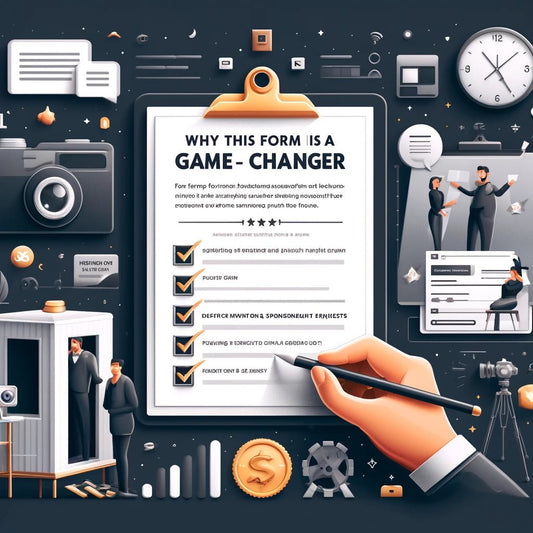.jpg)
Corporate event planning involves the meticulous organization and management of various events with the purpose of strengthening business objectives and fostering connections within the corporate world. It encompasses a range of activities such as conferences, trade shows, product launches, team building activities, and corporate retreats. A comprehensive article published by Eventbrite highlights the significance of corporate event planning in driving growth and success for businesses.
Understanding the different types of corporate events can help tailor the planning process to specific goals and desired outcomes. Conferences and seminars provide opportunities for knowledge sharing and networking, while product launches showcase new offerings to target audiences. Trade shows and exhibitions offer exposure and lead generation, while team building activities and corporate retreats enhance collaboration and employee engagement.
To ensure a successful corporate event, several key steps must be followed. These include establishing clear objectives, budgeting effectively, choosing suitable venues, promoting and marketing the event, managing logistics and operations, planning the agenda and activities, and hiring event services and suppliers. managing registrations and attendees is crucial to ensure a smooth and seamless experience.
Corporate event planning is not without its challenges. Limited budgets, selecting the right venue, obtaining permits and licenses, event marketing, and coordinating with vendors can pose hurdles. However, with careful planning and execution, these challenges can be overcome.
To achieve successful corporate event planning, certain tips and strategies can be implemented. Starting the planning process early, creating a detailed checklist, effective communication, prioritizing attendee experience, and evaluating and learning from each event are all vital for achieving favorable outcomes.
By understanding the essence of corporate event planning and implementing best practices, businesses can create impactful events that drive their goals, enhance their brand image, and foster valuable connections within the corporate landscape.
What is Corporate Event Planning?
Corporate event planning is the process of organizing and managing events for corporations or businesses. What is corporate event planning? It involves meticulous planning, coordination, and execution of various aspects, such as venue selection, budgeting, logistics, and program design. The goal of corporate event planning is to create memorable and impactful experiences that align with the company's objectives and goals. What is corporate event planning? It involves understanding the needs and preferences of the attendees, ensuring smooth operations, and delivering a successful event that leaves a lasting impression. Through careful attention to detail, effective communication, and strategic decision-making, corporate event planning plays a crucial role in enhancing brand image, fostering relationships, and achieving business objectives.
Importance of Corporate Event Planning
The importance of corporate event planning cannot be overstated. It is crucial for the success of businesses as it ensures that events are organized and executed seamlessly, leaving a lasting and positive impact on attendees. By carefully considering every detail, from venue selection to catering, corporate event planning strengthens the brand image, enhances client and employee relationships, and ultimately contributes to business growth. Investing in professional event planning allows businesses to effectively engage their target audience and establish themselves as industry leaders, all while creating a memorable experience that aligns with the company's goals and values.
Why is Corporate Event Planning Essential for Businesses?
Corporate event planning is essential for businesses because it helps them achieve their goals more effectively. Why is Corporate Event Planning Essential for Businesses? Here are some reasons why:
- Networking: Corporate events provide opportunities for businesses to network with potential clients, partners, and investors.
- Brand Building: Well-planned events help businesses showcase their brand and establish a positive reputation in the industry.
- Employee Engagement: Corporate events boost employee morale, foster teamwork, and promote a sense of belonging.
- Knowledge Sharing: Conferences and seminars organized as part of corporate events allow businesses to share industry insights and expertise.
- Lead Generation: Corporate events attract targeted audiences, increasing the chances of generating leads and new business opportunities.
By investing in corporate event planning, businesses can experience these benefits and achieve their objectives effectively.
Types of Corporate Events
Discover the exciting world of corporate events as we explore the various types that companies organize. From influential conferences and high-powered seminars to captivating product launches and captivating trade shows, each event plays a unique role in the business landscape. We'll also delve into the significance of engaging team building activities and rejuvenating corporate retreats. Get ready to uncover the incredible versatility and impact of corporate events in this captivating journey.Conferences and Seminars
Conferences and seminars are common types of corporate events that offer opportunities for networking, learning, and collaboration. These events bring together professionals from various industries, allowing participants to meet and connect with like-minded individuals. Additionally, conferences and seminars feature speakers, workshops, and panel discussions that provide valuable insights and expertise on specific topics or industries. They also serve as a platform for businesses to showcase their products or services, generate leads, and build partnerships. Attending these events helps businesses stay updated on the latest industry trends, technologies, and best practices. Moreover, individuals can enhance their skills, gain new knowledge, and broaden their perspectives by participating in conferences and seminars.
Product Launches
- Product launches are a crucial part of corporate event planning, aiming to successfully introduce new products to the market. When organizing a product launch, it is important to define clear objectives: Outline the goals and desired outcomes for the launch event.
- Target audience is a key factor to consider when planning a product launch. It is essential to identify the specific demographic and market segment that the product is designed for.
- Venue selection is an important aspect of a product launch. Choose a venue that aligns with the brand image and can accommodate the expected number of attendees.
- To ensure a successful product launch, it is vital to develop a comprehensive marketing strategy to create buzz and generate excitement around the product.
- Incorporating interactive experiences is crucial during a product launch. These activities allow attendees to engage with the new product and understand its features.
- Media interaction plays a significant role in maximizing the exposure of a product launch. It is important to invite relevant media outlets to cover the event.
- Collecting feedback from attendees is essential for future improvements. Provide opportunities for attendees to provide feedback on the product and gather valuable insights.
- After the product launch, it is important to develop follow-up plans, such as ongoing marketing campaigns and customer support, to maintain momentum.
Trade Shows and Exhibitions
Trade shows and exhibitions are essential types of corporate events that offer businesses opportunities to showcase their products or services to a wider audience. Here is a comprehensive list of considerations for successful participation in trade shows and exhibitions:
- Set clear goals: Clearly define your objectives for attending the event, whether it involves generating leads, increasing brand awareness, or networking with industry professionals.
- Choose the right event: Conduct thorough research on trade shows and exhibitions that specifically cater to your target audience and align with your industry.
- Plan your booth: Create a visually appealing booth that accurately represents your brand and captures the attention of visitors. Make use of captivating displays, interactive elements, and informative materials.
- Engage with attendees: Provide training to your staff to proactively approach visitors, initiate conversations, and effectively communicate the value proposition of your products or services.
- Follow up afterward: Remember to follow up with the leads and contacts you established during the event to maximize the return on your investment.
Pro-tip: Create a memorable booth experience by offering interactive activities, such as product demonstrations or personalized consultations, to leave a lasting impression on attendees.
Team Building Activities
- Outdoor adventures: Engage in team building activities such as rock climbing, hiking, or obstacle courses to foster trust and problem-solving skills. These team building activities promote collaboration and communication among employees, resulting in improved morale and productivity.
- Escape rooms: Work together to solve puzzles and riddles within a designated time frame, encouraging teamwork and critical thinking. Escape rooms are excellent team building activities that promote collaboration and communication among employees.
- Cooking classes: Encourage collaboration and creativity as teams work together to prepare a meal or bake goods. Cooking classes are great team building activities that promote teamwork and communication among employees.
- Team sports: Organize friendly competitions, such as soccer or volleyball, to encourage teamwork, leadership, and friendly competition. Team sports are effective team building activities that promote collaboration and communication among employees.
- Community service: Engage in charitable activities, such as volunteering at a local shelter or planting trees, to foster a sense of unity and social responsibility. Community service is a meaningful team building activity that promotes collaboration and communication among employees.
Corporate Retreats
```Corporate retreats are a valuable tool for businesses to foster team building, enhance productivity, and promote a positive work culture. These corporate retreats provide an opportunity for team members to connect on a personal level, fostering stronger relationships and improving collaboration. Being in a new environment can spark fresh ideas and creative thinking, leading to innovation within the team. In addition, engaging in team-building activities and challenges during the corporate retreats can improve problem-solving abilities and encourage effective decision-making. The relaxed atmosphere created by these corporate retreats allows team members to express their ideas, concerns, and feedback more freely, thus improving communication. Furthermore, taking a break from the usual work routine and participating in recreational activities at corporate retreats can help alleviate stress and prevent burnout among employees.
Key Steps in Corporate Event Planning
When it comes to corporate event planning, there are several key steps that need to be taken to ensure its success. From establishing event objectives to managing registrations and attendees, each sub-section plays a crucial role in the overall process. Get ready to dive into the intricacies of budgeting, venue selection, event promotion, logistics, agenda planning, hiring services, and more. By the end of this section, you'll have a comprehensive understanding of what it takes to organize a memorable corporate event that leaves a lasting impression.Establishing Event Objectives
- Establishing the purpose of the event: Determine the main goals and objectives you want to achieve with the corporate event.
- Define key metrics for success: Establish specific, measurable, and attainable targets that will help evaluate the event's effectiveness.
- Identify target audience: Determine the specific group of attendees or participants that the event is intended for.
- Create a clear event brief: Develop a comprehensive document outlining the event objectives, key messages, and desired outcomes.
- Align event objectives with overall business goals: Ensure that the event objectives are aligned with the broader organizational strategies and objectives.
In 2005, the London G20 Summit aimed to establish event objectives that would effectively address global economic challenges and promote financial stability. World leaders came together to establish clear goals, such as reducing trade barriers and promoting global growth, which led to significant progress in international economic cooperation.
Budgeting
Effective budgeting is essential for successful corporate event planning. Here are the key steps to consider when budgeting for a corporate event:
For more information on corporate event planning, you can visit the Corporate event planning article.
1. Determine event objectives: Clearly identify the goals and objectives of the event to establish a budget that aligns with the desired outcomes.
2. Allocate funds: Effectively budget the overall expense for the event and allocate funds accordingly to different aspects such as venue, catering, marketing, entertainment, and logistics.
3. Research costs: Thoroughly research and gather cost estimates from vendors, suppliers, and service providers to obtain a precise understanding of the expenses involved.
4. Prioritize expenses: Prioritize event expenses based on their importance and relevance to the event objectives. Allocate a substantial portion of the budget to critical elements.
5. Create a contingency fund: Set aside a portion of the budget as a contingency fund to account for unexpected expenses or any last-minute changes that may arise.
6. Track expenses: Keep a detailed record of all the expenses incurred during the planning and execution phases. Regularly review and update the budget to ensure it remains on track.
7. Review and adjust: Once the event is over, review the actual expenses in comparison to the budgeted amount. Evaluate the success of the event and make necessary adjustments for future budgeting purposes.
By following these steps, corporate event planners can effectively budget and ensure financial success for their events.
Choosing a Venue
When choosing a venue for a corporate event, there are several factors that should be considered to ensure its suitability. Capacity is an essential aspect to determine if the venue can comfortably accommodate the anticipated number of attendees. It is also important to consider the location of the venue, taking into account its accessibility and proximity to transportation and accommodation options. Another important factor is evaluating the available facilities and amenities, such as audiovisual equipment, Wi-Fi, and catering services. Additionally, it is crucial to reflect on whether the venue aligns with the event's branding and atmosphere. Lastly, it is necessary to compare pricing and negotiate favorable rates within the allocated budget. By carefully selecting a venue that incorporates all of these considerations, it can greatly enhance the overall experience and contribute to the success of the corporate event.
Event Promotion and Marketing
Event promotion and marketing are crucial aspects of corporate event planning. To ensure the success of your event, it is important to effectively promote it and attract attendees. Here is a list of strategies to consider:
- Create a comprehensive marketing plan that includes online and offline promotional activities.
- Utilize social media platforms to reach a wider audience and engage with potential attendees.
- Design visually appealing event invitations and promotional materials.
- Collaborate with influencers or industry experts to promote your event.
- Offer early bird discounts or special promotions to encourage early registration.
- Use email marketing campaigns to stay in touch with potential attendees and provide updates on the event.
- Partner with relevant media outlets or industry publications for event promotion.
- Use targeted advertising campaigns to reach your specific target audience.
- Encourage word-of-mouth marketing by providing incentives for attendees to refer their peers.
Logistics and Operations
Logistics and operations are crucial aspects of successful corporate event planning. By efficiently managing these elements, events can run smoothly and leave a positive impression on attendees. Here are some key considerations for logistics and operations:
1. Venue setup: Ensure proper space allocation, seating arrangements, and equipment setup to accommodate attendees and meet event objectives.
2. Supplier coordination: Coordinate with vendors for services like catering, AV equipment, and transportation to ensure timely and seamless execution.
3. Technical support: Arrange for technical staff to handle audiovisual equipment, lighting, and any potential technical issues during the event.
4. On-site coordination: Assign a dedicated team to oversee operations, manage registrations, handle logistics, and address any unforeseen situations.
| 1. Venue setup | Ensure proper space allocation, seating arrangements, and equipment setup to accommodate attendees and meet event objectives. |
| 2. Supplier coordination | Coordinate with vendors for services like catering, AV equipment, and transportation to ensure timely and seamless execution. |
| 3. Technical support | Arrange for technical staff to handle audiovisual equipment, lighting, and any potential technical issues during the event. |
| 4. On-site coordination | Assign a dedicated team to oversee operations, manage registrations, handle logistics, and address any unforeseen situations. |
To ensure successful logistics and operations, it is important to have clear communication, documentation, and contingency plans in place. Regularly assess and improve processes based on feedback and learnings from each event.
Planning the Agenda and Activities
- When planning the agenda and activities for a corporate event, it is essential to consider the objectives of the event and the preferences of the attendees. Here are some key steps to take in this process:
- Define the goals and objectives of the event. Determine what you want to achieve and tailor the agenda and activities to align with these goals.
- Identify the target audience and their interests. Understand what topics and activities will resonate with them and keep them engaged throughout the event.
- Research and select relevant speakers and presenters. Look for industry experts or influential figures who can deliver informative and inspiring sessions.
- Create a detailed schedule. Plan the order and duration of each session, allowing for breaks and networking opportunities.
- Incorporate interactive activities and team-building exercises. This can include workshops, panel discussions, and group activities to promote engagement and collaboration.
- Consider incorporating technology and multimedia elements. Utilize audiovisual equipment and interactive tools to enhance presentations and engage the audience.
- Ensure a smooth transition between sessions. Coordinate logistics and manage communication to keep everything on schedule and provide a seamless experience for attendees.
- Seek feedback and evaluate the success of the agenda and activities. Use this information to improve future events and tailor them to the needs and preferences of the attendees.
Hiring Event Services and Suppliers
When it comes to corporate event planning, hiring event services and suppliers is crucial. Here are some key considerations to keep in mind:
| - Research and compare different event service providers to find the ones that align with your needs and budget. |
| - Ensure that the event services and suppliers you choose have experience in corporate events and understand your objectives. |
| - Check for references and reviews to ensure the reliability and quality of service offered by the event services and suppliers. |
| - Negotiate contracts and pricing to ensure you get the best value for your money when hiring event services and suppliers. |
| - Communicate your requirements and expectations clearly to the event services and suppliers you decide to work with. |
| - Monitor the progress and collaborate closely with the event services and suppliers to ensure everything is on track for a successful corporate event. |
| - Have a contingency plan in case any issues arise with a particular event supplier or service. |
By carefully selecting and working with reliable event services and suppliers, you can ensure a successful and smooth corporate event experience.
Managing Registrations and Attendees
- Effectively managing registrations and attendees is a fundamental element of successful corporate event planning.
- One way to ensure a seamless process is by creating an online registration system to simplify the attendee registration process.
- Gather all pertinent information, including names, contact details, dietary restrictions, and preferences.
- Communicate event details and pertinent information to registered attendees through confirmation emails.
- To facilitate check-in and badge collection at the event venue, provide attendees with clear instructions.
- Utilize event management software to effortlessly track attendee registrations and monitor capacity.
- Assign dedicated staff or volunteers to assist with on-site registration and attendee management.
- Implement an efficient system for managing walk-in registrations and accommodating last-minute changes.
Fact: Based on a survey, 79% of event planners consider managing attendee registrations as one of the most challenging aspects of event planning.
Common Challenges in Corporate Event Planning
Planning a corporate event can be quite the undertaking, with numerous challenges that event organizers face along the way. In this section, we'll dive into some of the common hurdles that arise during corporate event planning. From working within a limited budget to navigating the complexities of venue selection, obtaining permits and licenses, event marketing, and coordinating with vendors, we'll explore each aspect and provide insights to help you tackle these challenges head-on. So, let's get ready to conquer the corporate event planning maze!Limited Budget
When planning a corporate event on a limited budget, it is important to prioritize spending and allocate your budget accordingly. Researching cost-saving options such as affordable venues, negotiating with vendors for discounts, and considering alternative options for decor and catering can help maximize resources while still creating a successful event. Additionally, you can rely on technology to save on costs associated with printing and physical presence by utilizing online registration platforms, digital marketing strategies, and virtual event tools. Another way to offset costs is by partnering with sponsors who align with your event's goals and offering them exposure in return. You could also consider engaging in cost-sharing by co-hosting the event with other companies or organizations, dividing expenses, and expanding your network.
Venue Selection
- When it comes to venue selection, identifying the event requirements and objectives is crucial for a successful corporate event.
- To ensure that the venue can comfortably accommodate all attendees, it is important to consider the event size and capacity requirements during venue selection.
- When choosing a venue, it is necessary to take location into account, considering factors such as accessibility, transportation, and proximity to participants.
- As part of the venue selection process, it is essential to assess the facilities and amenities available, including audiovisual equipment, parking, and catering options.
- To ensure quality service and professionalism, it is recommended to review the reputation and past event experiences of potential venues during the venue selection phase.
- To ensure the chosen venue fits within your budget, obtaining quotes and comparing prices is a vital step during the venue selection process.
- To determine whether a venue is suitable for your specific event needs, it is advisable to visit potential venues in person and assess the ambiance, layout, and functionality.
- During the venue selection process, consider any additional services or support provided by the venue, such as event coordination or on-site staff assistance.
- Once the venue selection is finalized, secure the booking by signing a contract with the chosen venue.
By following these steps, you can ensure that your venue selection will meet all your requirements and contribute to a successful corporate event.
Obtaining Permits and Licenses
- Research the specific permits and licenses required for your corporate event based on its nature, location, and activities.
- Contact authorities: Reach out to the relevant local government agencies or departments to inquire about the needed permits and licenses.
- Complete applications: Accurately fill out the required application forms for obtaining permits and licenses and provide any necessary supporting documents or information.
- Submit applications: Within the designated timelines, submit the completed applications along with the required fees to the appropriate authorities.
- Follow up: Keep track of the progress of your permit and license applications and follow up with the authorities if necessary to ensure timely approval.
- Comply with conditions: After obtaining the permits and licenses, ensure adherence to any imposed conditions or restrictions, such as noise limits or occupancy limits.
- Keep documentation: Throughout the event planning and during the actual event, maintain copies of the permits and licenses to demonstrate compliance if required.
Event Marketing
Event marketing is a crucial aspect of successful corporate event planning. It involves promoting and creating awareness about the event marketing to attract attendees and generate interest. Here are some effective event marketing strategies:
- Utilize social media platforms to reach a wide audience and create buzz.
- Create a visually appealing event marketing website or landing page with all the necessary details.
- Send targeted email invitations to potential attendees and industry professionals.
- Collaborate with influencers or industry leaders to endorse and promote the event marketing.
- Use online advertising and paid search campaigns to increase visibility and reach.
Remember, effective event marketing is all about engaging the right audience and creating excitement around the event marketing. By implementing these strategies, you can maximize attendance and make your corporate event marketing a success.
Coordination with Vendors
Coordination with vendors is a crucial component of corporate event planning. It entails working closely with vendors to guarantee the smooth execution and fulfillment of event requirements. Effective coordination encompasses transparent communication, establishing expectations, and maintaining regular updates throughout the planning process. Several key areas necessitate coordination with vendors, including:
| 1. Catering: | Collaborate with food and beverage vendors to determine menu options, dietary restrictions, and logistics for meals during the event. |
| 2. Audio-Visual Services: | Coordinate with AV vendors to set up and operate sound, lighting, and multimedia equipment for presentations, entertainment, and stage setup. |
| 3. Décor and Design: | Work closely with vendors to discuss themes, decorations, floral arrangements, and overall ambiance to create a cohesive visual experience. |
| 4. Transportation: | Coordinate with transportation services to arrange logistics for attendees, including airport transfers, shuttle services, or car rentals. |
| 5. Photography and Videography: | Communicate with vendors to capture event highlights, manage photo shoots, and ensure timely delivery of high-quality images and videos. |
Efficient coordination with vendors ensures that all aspects of the event come together flawlessly, resulting in a successful and memorable corporate event.
Tips for Successful Corporate Event Planning
Planning a successful corporate event requires meticulous attention to detail and effective communication. In this section, we will uncover valuable tips and strategies to ensure your event goes off without a hitch. From starting your planning process early to creating a comprehensive checklist, we'll explore the essential steps for a flawless event. We'll also discuss the significance of effective communication and prioritizing the attendee experience. And finally, we'll highlight the importance of evaluating each event to continuously learn and improve. Get ready to master the art of corporate event planning!Start Planning Early
- Incorporate the keyword "Start Planning Early" in the first sentence of the text by saying, "To ensure a successful and stress-free event, it is crucial to start the corporate event planning process early."
- Create a timeline: Set clear deadlines for each stage of the planning process to ensure everything is completed on time.
- Identify the event objectives: Clearly define the goals and objectives of the event to guide your planning and decision-making.
- Research and secure a venue: Begin researching and booking a venue well in advance, as availability can be limited when you start planning early.
- Develop a budget: It is essential to start the planning process early to determine the budget for the event and allocate funds accordingly. Consider factors such as the venue, catering, and entertainment while budgeting.
- Formulate a marketing plan: Start the marketing strategy early to maximize attendance by promoting the event well in advance.
Create a Detailed Checklist
Creating a comprehensive checklist is vital in the process of corporate event planning to ensure the completion of all necessary tasks and prevent any oversight. Here is a reference checklist template:
Communicate Effectively
By effectively communicating in corporate event planning, you can ensure a successful event that incorporates all stakeholders. Effective communication is crucial for keeping everyone informed and aligned. Here are some tips to help you communicate effectively:
1. Set clear expectations: Clearly define the roles, responsibilities, and timelines for everyone involved in the event planning process. This helps to avoid any confusion or misunderstandings.
2. Utilize multiple communication channels: Make use of various communication channels such as email, phone calls, meetings, and project management tools to keep everyone well-informed and updated on the progress of the event.
3. Be concise and organized: Deliver information in a clear and concise manner, using bullet points or summaries to highlight important details. This helps to ensure that everyone understands the key points without getting overwhelmed with excessive information.
4. Foster open communication: Encourage team members to openly share their ideas, concerns, and feedback. Creating a collaborative environment where everyone feels comfortable expressing their thoughts can lead to innovative solutions and a stronger event.
5. Regularly follow up: Keep in touch with team members, suppliers, and stakeholders to ensure that everyone is on the same page and address any issues or concerns promptly. Following up regularly helps to maintain clear communication and prevents any potential problems from escalating.
By incorporating these effective communication strategies, you can enhance collaboration, minimize misunderstandings, and ensure the success of your corporate event.
Prioritize Attendee Experience
When planning a corporate event, it is crucial to prioritize the attendee experience. To provide exceptional customer service and ensure a successful and memorable event, consider the following:
- Create engaging content: Develop informative and relevant presentations, interactive workshops, and panel discussions that prioritize the attendee experience by addressing their needs and interests.
- Provide comfortable facilities: Select a venue that not only offers comfortable seating but also ample space, excellent acoustics, and other amenities such as restrooms, refreshments, and charging stations, which will contribute to enhancing the attendee experience.
- Offer networking opportunities: Facilitate networking between attendees by organizing dedicated networking sessions, ice-breaker activities, and social events, all geared towards prioritizing the attendee experience and fostering connections.
- Deliver exceptional customer service: Train event staff to be friendly, knowledgeable, and attentive to attendees' needs throughout the event, ensuring that the attendee experience is paramount.
- Solicit feedback: Actively seek feedback from attendees through surveys or evaluations to identify areas for improvement that will enhance the attendee experience and ensure future events are better tailored to their needs.
Evaluate and Learn from Each Event
When it comes to continuous improvement and achieving success, it is absolutely crucial to evaluate and learn from each corporate event. Follow these steps to ensure you make the most of the experience:
- Collect feedback: Take the time to gather feedback from attendees, sponsors, and vendors. This can be done through surveys or interviews.
- Analyze data: carefully review the feedback received and identify any patterns, strengths, weaknesses, and areas that require improvement.
- Evaluate goals: Assess whether the event effectively achieved its objectives and understand how it impacted the overall business.
- Review logistics: Dedicate some time to examine the event logistics and operations, identifying any areas that can be streamlined or improved.
- Learn from mistakes: Pinpoint any challenges or mistakes that occurred during the event and strategize ways to prevent them in future events.
- Implement changes: Utilize the valuable insights gained from the evaluation process to make necessary adjustments and improvements for upcoming events.
- Track progress: Measure the success of the implemented changes by comparing results from previous events, ensuring continuous growth and improvement.







